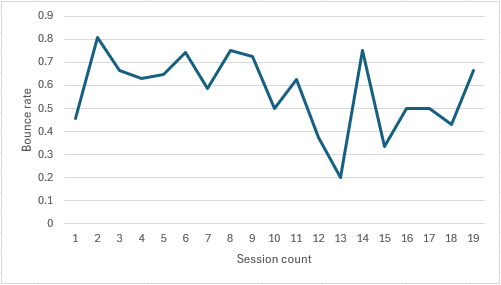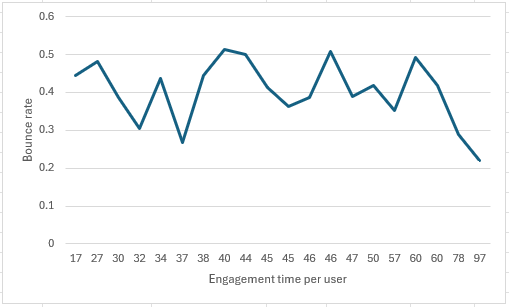What is the bounce rate in Google Analytics 4? Is it better to be higher or lower? What is typical? Does it affect my search engine rankings? Here is some insight into this commonly misunderstood metric.
Bounce Rate is Not What You Think
Google defines the bounce rate in Google Analytics 4 as “The percentage of sessions that were not engaged” (i.e., sessions in which the person left within 10 seconds and did not click, scroll or interact with the page). In reality, it is a calculated metric with a few problems:
bounce rate = 1 - ((engaged sessions) / sessions)
If you think bounces are disinterested visits that happen when a user first hits your site, then leaves right away without doing anything, you are wrong — it may not actually be the beginning of their interaction with your site; it could be the end.
‘Bounced’ First Sessions (and Second, and Third…)
If we look at the bounce rate versus the session count, we would expect disinterested users would leave on the first session and not return, so the bounce rate for that first session would be higher. What we find instead is that the bounce rate could actually increase for the second session and even some later sessions.
Every website is different, but here is an example that shows the bounce rate jumps from 45% for the first session to over 80% for the second. Why would this happen?

Consider this scenario: a person opens a page in the morning and reads for a while, then switches to other things, leaving the tab in the background, then switches back to the tab midday briefly while looking for something else, then again late in the day just long enough to close it. GA 4 would log 3 sessions, the last 2 of which would have no engagement, so you would see 1 engaged session from 3 sessions, a 67% bounce rate. Sounds bad, but that was an interested user that read your page with real interest. Bounced sessions are not the ones where new users ‘bounce’ off your site — they are simply a byproduct of today’s multi-tab, time-sliced browsing habits.
Bounce Rate as a (Poor) Measure of Page Engagement
What about as a measure of interest in a landing page? Surely some pages have better bounce rate than others…and yes, there are some with lower bounce rates.

But if you look at the average engagement time per user for those same pages — the time the users actually spent reading the page — you would see that there really is no correlation between user engagement time and bounce rate. Bounce rate is not a measure of user interest in a page.

Answering The Questions
So, what is a good bounce rate? Is lower better? Does it affect my search rankings? Those are all questions from 10 years ago that simply won’t die — they are no longer relevant. Bounce rate is not what it used to be, and people don’t use the web the way they used to.
Web analytics have changed. Stop focusing on old metrics like sessions and bounce rate; start looking at user engagement.